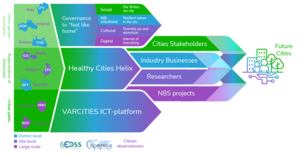Horizon VARCITIES

In an increasingly urbanised world, cities face several challenges and threats, struggling to propose credible urban futures and new opportunities for their citizens. VARCITIES (Visionary nature-based actions for health, well-being and resilience in cities) is an ambitious project that puts the citizens and the “human communities” at the centre of future cities’ vision, in the belief that future cities should become fully human-centred.
The project has received funding from the European Union’s Horizon 2020 Research and Innovation programme, under the topic SC5-14-2019 - Visionary and integrated solutions to improve well-being and health in cities. VARCITIES officially started in September 2020 and it will last until February 2025. The Consortium is composed of 25 partners under the lead of Telecommunication System Institute (TSI). Eight Pilot Cities will test and implement a series of innovative nature-based actions.
The vision of VARCITIES is to implement visionary ideas and add value by establishing sustainable models for increasing the health and well-being of citizens exposed to diverse climatic conditions and challenges. VARCITIES sets the ambitious target to advance innovation across different urban scales by fully exploiting nature-based solutions from a digital, social and cultural perspective.
A holistic project
-
Future City: VARCITIES envisions solutions which foster a healthier, sustainable and resilient urban future.
-
Human-centred: future cities need to become fully human-centred, putting citizens and the human communities at the centre of the cities’ vision.
-
Green public spaces: public spaces are envisioned as people-centred areas that support creativity, inclusivity, health, and happiness for the citizens.
-
Smart and Resilient: nature-based solutions contribute to urban resilience but need to be integrated with smart devices and exploited also digitally.
Approach
VARCITIES seeks to make European cities places of Health & Well-Being and to contribute to the “right to the city” as specified in the Habitat III New Urban Agenda by integrating Nature-based Solutions with Digital, Social and Cultural and environmental aspects to tackle the major challenges of future cities. Horizontal activities, cross learning and shared R&D benefits among the 8 European pilot cities are key to successful and replicable pilot demonstrations. VARCITIES focuses on different scales of the urban context through testing visionary solutions at:
- District level
- Creation of a mobile urban living room in open public spaces | Chania (Greece)
- “Healing Garden” for elderly and people suffering from Alzheimer | Castelfranco Veneto (Italy)
- Library and Museum Quarter | Dundalk (Ireland)
- Old dump connecting residential areas | Skellefteå (Sweden)
- Site level
- Regeneration of hospital site | Leuven (Belgium)
- Greening a high traffic road | Gzira (Malta)
- Urban recreational parks in a large-scale intervention:
- Creation of a city beach | Bergen (Norway)
- Recreational centre by regenerating a military brownfield | Novo mesto (Slovenia)
Objectives
-
Design visionary Nature-Based Solutions which contribute to the shaping of future cities and the well–being of citizens in eight European cities.
-
Monitor and assess the sustainability and the impact of interventions through advances KPIs (Key Performance Indicators) for health and well-being.
-
Improve the sustainable transition to smart and future cities by creating a framework of locally adapted GBF (Governance, Business, Financing) models.
-
Include various stakeholders in the co-design process and inspire sustainable and resilient future smart cities.
-
Achieve knowledge exchange, maximum EU investments, and advancement beyond the state of art through clustering with other European initiatives and platforms.
-
Transfer, upscale and sustain best practices from VARCITIES through the development of a Healthy Cities Helix.


